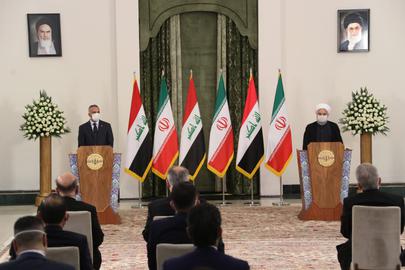A day before Iraqi Prime Minister Mustafa Al-Kazemi's visit to the Saudi capital, Riyadh, at the official invitation of the Saudi Crown Prince Muhammad bin Salman, Iranian Foreign Minister Mohammad Javad Zarif met with the President of the Republic Barham Salih and Prime Minister Mustafa Al-Kazemi in Iraq to discuss a new phase of relations between Iraq and Iran.
In an interview with IranWire, Amer Al-Fayez, the leader of the Al-Fatah Alliance, which has close links to Tehran, said the July 19 visit was supposed to reassure Iranian officials. He said the Iraqis wanted to remove doubts that the office of the prime minister had distanced itself from the Iranian axis following Mustafa Al-Kazemi coming into power, adding that the visit was also supposed to send a message to the Gulf countries, specifically Saudi Arabia, that Tehran is willing to undertake certain negotiations under Iraqi mediation.
Meanwhile, the Iraqi Prime Minister's media office announced that the postponement of Al-Kazimi's visit to Saudi Arabia was due to the Saudi monarch King Salman bin Abdulaziz having suddenly fallen ill. The meeting was due to be rescheduled for a later date.
Saudi Foreign Minister Faisal bin Farhan tweeted: ”The Kingdom appreciates the Iraqi Prime Minister's choice to visit it as the first international trip he makes after taking office, and in respect to this very important visit, the Saudi leadership prefers to postpone it until King Salman's discharge from hospital."
Iraqi Mediation
In an exclusive interview with IranWire, Gabriel Soma, US President Donald Trump's Middle East affairs advisor, said Iraqi was mediating between Tehran on one side, and Riyadh and Washington on the other. He also said that Iran had been interfering extensively in Iraqi internal affairs, especially with regard to the militias that receive support from Iran. He indicated that he did not believe Tehran would give up its support for these militias despite Al-Kazemi’s visit to Iran and Zarif's visit to Iraq.
Soma added that the dispute between Saudi Arabia and Iran runs much deeper than anything Al-Kazemi could solve, while also noting that the Supreme Leader’s policy from the beginning has been to eliminate Arab regimes, including that of Saudi Arabia. He stressed that tensions between Iran and the United States were a result of Iran's insistence on acquiring nuclear weapons in order to blackmail neighboring countries, as well as to confront the threat of Israel in particular.
In the same context, Entifadh Qanbar, President of the Future Foundation in Washington, said that he does not understand the role Baghdad can play as a mediator, chiefly because Iraq is currently in debt and in a weak position. It is perhaps precisely because of this that Tehran is trying to use Iraq and President Al-Kazemi as a bearer of messages, which Qanbar described as a matter of disgrace for the country. He further described the relationship between Iraq and Iran as deeply flawed and not likely to improve. He said both Al-Kazemi's visit to Tehran and Zarif's visit to Baghdad will be viewed with suspicion due to the lack of mutual respect. The relationship, he said, was one of ruler and the ruled, or the oppressor and the oppressed. Iranian influence in Iraqi decision-making was notable, he said.
Saudi Cancellation or Postponement?
Entifadh Qanbar added that Al-Kazemi’s visit to Saudi Arabia was postponed because Riyadh realized Baghdad was not serious about dismantling the militias or stopping energy imports from Iran. Iran, he said, was only resorting to Saudi Arabia in order to obtain the necessary funds, and Riyadh feared these funds would be put to use by the militias. He argued that the Saudi monarch's illness was an excuse, a way of postponing Al-Kazemi's visit until Saudi Arabia was convinced that the Iraqi government is serious about dealing with Iran's interference.
Saudi writer and political analyst Dr. Ahmad Al-Shahri told IranWire that Saudi Arabia would welcome Al-Kazemi’s visit and he would be given the Saudi government's full support. He explained that there were currently 13 agreements between the two countries that had previously broken down, and accused Iran of shutting down vital projects concerning Iraq, including an electricity supply arrangement and the construction of a sports city costing a billion dollars, adding that armed groups inside Iraq were not be prepared to accept anything but the Iranian model when it came to these initiatives.
Al-Shahri added that Zarif's visit to Baghdad was directly related to Al-Kazemi's announcement to visit Riyadh, and that in normal situations any Iraqi visit to Saudi Arabia would have been preceded by the Iranian foreign minister going to Baghdad, thereby limiting the framework of the visit to Iraqi officials. He indicated that Saudi Arabia does not deal with countries according to sectarian classifications However, Hadi Al-Amiri, the leader of the Al-Fatah Alliance, which has close links to Tehran, spoke of his rejection of any Iraqi agreement with Saudi Arabia in parliament, thereby revealing the extent to which Saudi Arabia is seen with regards to outward sectarianism.
Iranian Acquisition
Dr. Ghaleb Al-Dami, head of the Department of Journalism at Ahl Al-Bayt University, said Zarif's visit to Iraq is part of a plan to make sure Baghdad remains compliant to Tehran. Iran does not accept any other partner in its relationship with Iraq, instead wanting maintain a close-knit marriage with political decision-makers in Baghdad. He added that this was because Iraq is its golden cow, through which it milks billions from the gas and electricity it sells to it at four times its actual price.
In a statement to IranWire, the leader of the Kurdistan Democratic Party, Majed Shankali, confirmed that Zarif's visit sends a message to Iraqi parties that reject Iranian interference in Iraqi affairs, and can be seen as a statement that Iran is an important, powerful player in Iraq and that parties are not in a position to reject this reality. He added that the announcements regarding the visit showed that Al-Kazemi had gone to Iran to settle agreements on Iraqi security issues. This is a clear intervention, as that which concerns Iraqi security should be discussed internally, away from any interference from Iran or others.
He pointed out that Tehran had asked Al-Kazemi to increase the volume of the trade exchange between the two countries to $20 billion, a move that is not in the least surprising given that Iraq imports so much from Iran, but does not export goods. With that in mind, it is clear that any trade exchange would favor Tehran, which suffers from international and economic isolation from the international community and primarily only deals with Iraq.
Iraqi Prime Minister Mustafa Al-Kazemi visited Tehran on July 21 and met with Iranian President Hassan Rouhani and the Supreme Leader of the Islamic Republic, Ali Khamenei. The two sides stressed their desire to strengthen economic relations and to continue to cooperate to combat terrorism, as well as their ongoing shared commitment to support regional security and stability.
visit the accountability section
In this section of Iran Wire, you can contact the officials and launch your campaign for various problems

























comments